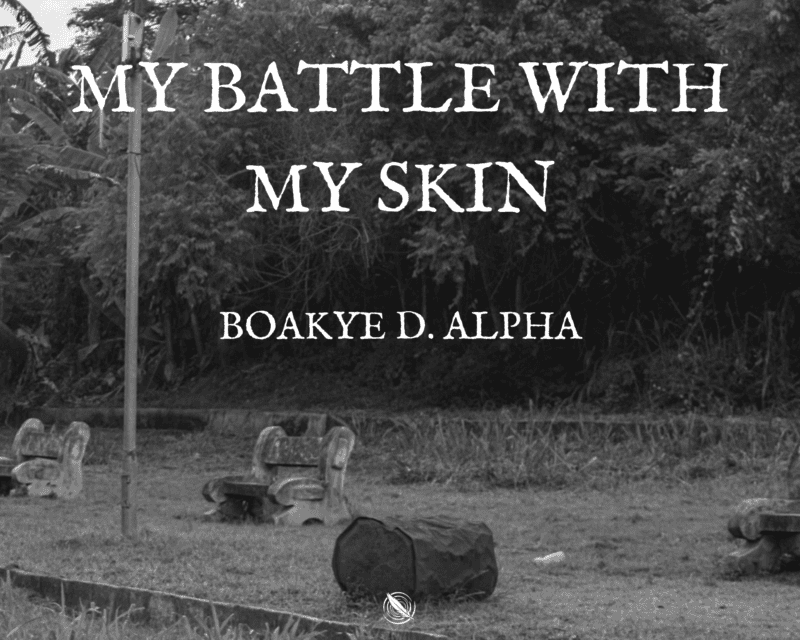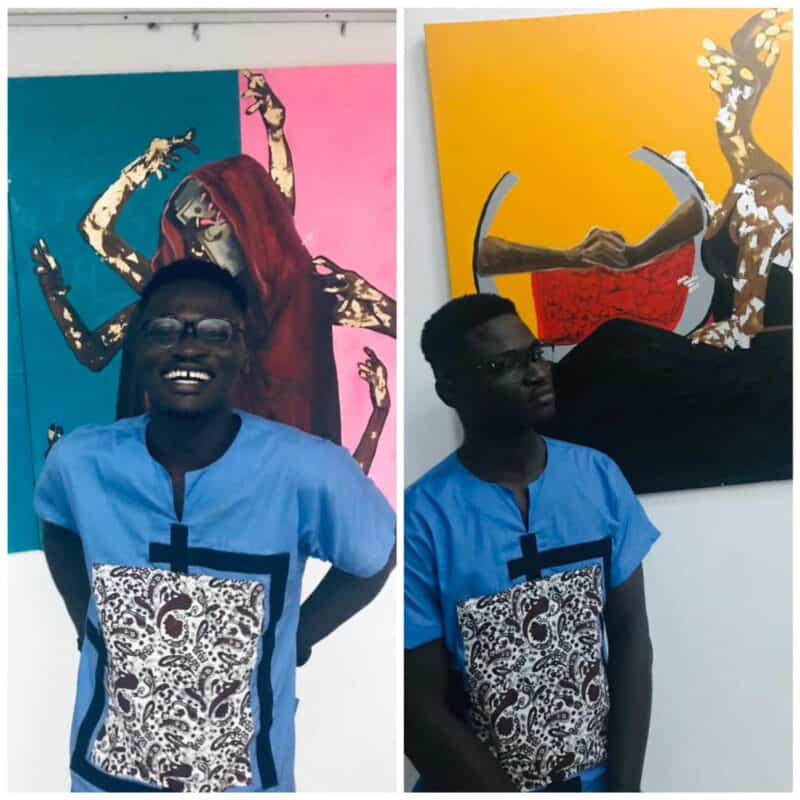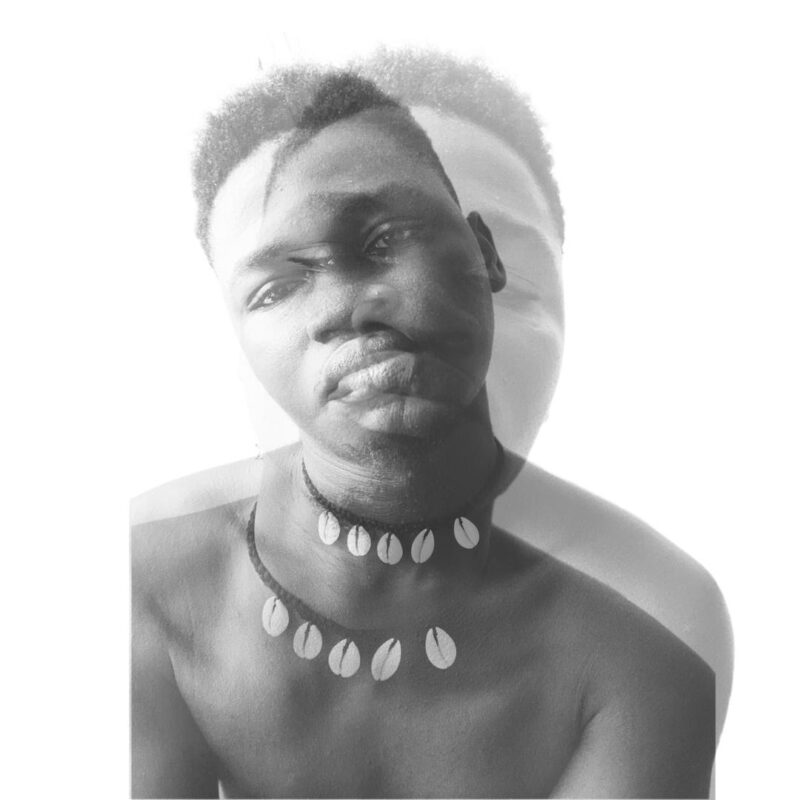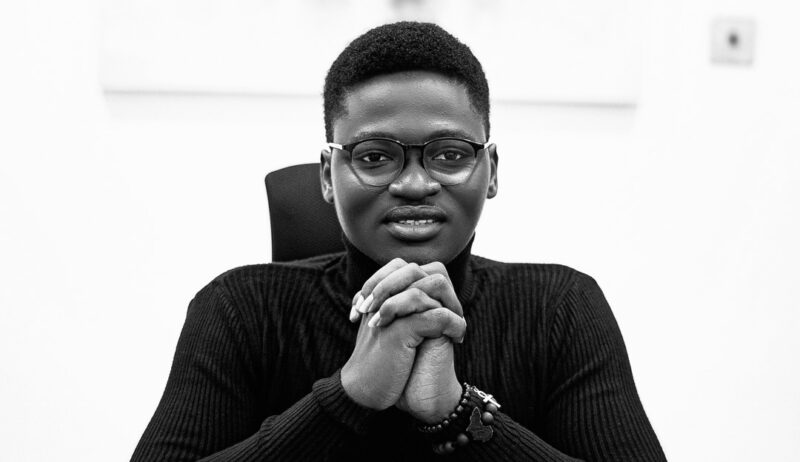
This is a raw and unfiltered capturing of a day in the life of a young man who grapples with profound insecurity about his very, very, very, dark skin. Well, that may be an exaggerated description, but, yes, that young man is me. I am that young man. I am that skin. That skin is me. And I am on a journey towards, maybe, a place of acceptance. This essay may be chaotic, but isn’t that the beauty of the raw and unfiltered? Just like my skin, (as my insecurities made me believe) this essay is not meant to be perfect. It doesn’t have to be perfect to be accepted.
*
I walked out that bleak Accra morning, when the day’s sky, with its canvas of blue, white, and orange hues painted by the Grand Artist’s might, was a wonder and a complete joy to look at, and wished the earth would get hungry and have me for breakfast, devour me whole. But that would take some doing. I had learnt my lesson. The earth never swallowed me in the past when I desperately needed it to. Not even when my tears, a sacrifice at the altar, touched hands with Earth’s face. Not when my knees went down in submission and readied to be taken apart did the earth once accept my surrender. None of my attempts to not exist made the earth take pity on me. So why could that day be any different? Sometimes, I am forced to believe the earth has also forsaken me for what I am.
I had no other choice but to bathe, dress to disguise my imperfections and head out. I wore a long black trouser and a blue shirt. Despite the explosive emotions that stirred within me that morning, there existed a resilience that refused to succumb to despair. It urged me to persevere, to seek solace in the present moment and to relish in the simple joys of life. Despite the weight of my troubles, this brave soul within me persisted, determined to uplift and inspire me to live fully.
I had a to-do list:
- Travel to the capital for the Pagya Literary Festival
- Get your shit together, and
- get through the first three days of your stay in the capital.
The plan was defined, simple, maybe. Nothing was going to stop me. Not the infrangible surge of low self-esteem. Not the part of me that wanted to be locked in the room hiding away from the world, concealing the mistake that I was. Not the baritone voices in my head, like a monotonous choir, singing songs of my dismay and eventual regret if I did not stay in the room and wallow in my depression. I told myself “Not today” and marched forward, fueled by a fierce determination to see my plans through, pushing past the doubts that threatened to weigh me down. With each step, I felt a sense of empowerment and freedom from the shackles of my mind.
20 minutes late, I was running up the stairs to the Abansoro, the “roof top” venue of the first workshop slated for the day. I was breathless from all the running, inwardly cursing myself. Why did you have to be late? I ignored the insistent reprimands of my inner voice, as I made my way up, dragging my feet, until I found the gathered group. They sat in a circle, every seat occupied. Or so I thought. I did a quick but thorough scan around until my eyes spotted a seat I could call my own for the next hour. And so, just like a diver would before submerging into the deep blue, I took a deep and long breath, deep enough to rob my surroundings of all the air and long enough to catch the attention of the workshop leader.
“Are you coming in?” It was a soft voice, feminine. It yanked me from my musing. I didn’t realise I had been standing there, out of touch with myself, for that long, until the person spoke. I had been holding my breath for so long. For whatever reason, I thought by that act — by trying not to breathe — I would be invisible, forgotten. I let out the air I held in, forced my lips into something resembling a smile, then took the first step. That first step would later prove to be a much-needed one. It was the step that changed my emotional composition for as long as I let it.
“You have a beautiful skin!” a different voice ambushed me before I could take my seat. It was sharp as it was unexpected. It was bold, assertive, marching with it all the affirmations one could assemble.
Somebody noticed me.
My brain faltered for a second—so briefly it went unnoticed—as I searched for who said it. Then I found her. There she was, this woman who didn’t look Ghanaian, not by looks, not by accent. For a second, my mind went numb as my thoughts raced for clarity. I let go of the overwhelming self-awareness, stepped away from the shadows, and let myself feel a new warmth. I smiled —genuinely this time — and whispered a “thank you.” The effect of her words was lasting. Without her knowledge, this woman’s words brought serenity to the weighty turbulence waging in me. To her, it perhaps was just a compliment, a genuine observation. But it meant a lot to me. I was falling apart and her words promised a repair.
*
Everything that happened on the first day started with a picture. For the three-day visit to Accra, I was to be engaged in a series of workshops and creative sessions featuring some notable figures in the literary space. It was the much-anticipated Pagya Festival Weekend. It was natural that, amidst the multitude of sessions and workshops vying for my attention, I made a conscious effort to immerse myself in the art, books, people, and the “culture” that surrounded me.
Earlier, I had struck up a deal with Elvis — who, just like me, came all the way from Kumasi to Accra for the workshops — to take a break from the series of workshops. We took a walk around the place. Elvis was the type who wasn’t afraid to take up space or make his presence known. He was shorter than me, a bit smallish, but had a way of commanding attention with his presence. We then sat in the lobby of Goethe Institut, talking about books, film, writing and our workshops when I noticed: we were right in the middle of an art exhibition. Different kinds of surrealist art hung all over the lobby. Two caught my eyes: one, a hooded creature with six human-like hands set against a blue and pink background, and the other, a woman with a hand for a head, seated on a red chair set against a yellow background. I wondered what those artworks meant. This exhibition might be about hands. I thought and I knew at that moment, without putting too much thought into it, that we had to take some pictures.
“Maybe I should take some pictures in front of this art,” I said, standing. Elvis’ brows furrowed, his expression changing. It was obvious he didn’t want to be my photographer. He would rather wrestle a hungry lion than volunteer to take a picture of me. I understood him. I made photographing me a Herculean task. I found something wrong with every picture, or more accurately, with myself in it. Elvis didn’t like that about me. He never agreed with my unkind perceptions of myself.
I stood in front of the first art. Smiled.
“Take a pose.” Click.
“Smile, please.” Click!
“Change your style.” Click.

After a few more shots, Elvis handed me the phone. I swiped front, forward and back through the pictures on the phone screen. My mind screamed. My heart sank.
Damn, dude, you are dark!
“I am too dark,” the words forced themselves out, rolling off my tongue, rogue, carrying depths of their own. That I was dark wasn’t lost on me. If I ever was in denial, everyone around me reminded me of it. So, yes, I knew I was dark. Yet, I was in shock. Accompanying that shock was something sinister. The shock brought a quietness within, a moment to feel my emotions reverse gear and girder my soul for what was to come.
“Yes, you are, and it is not a bad thing, my friend. It is a part of who you are. You are very dark, my friend, and you should be proud of it,” Elvis said, his voice carrying his worry for me. But it wasn’t the first time he had said those exact words to me. They became monotonous, in time. It also wasn’t the first time I would look down at myself, in denial, wishing I was something else, someone else, maybe slightly lighter. He knew that, too, but as I have come to know, he said the same words, anyway, hoping that they would get me to accept myself, to see myself for who I am, the boy with a charcoal dark skin. There was a way his eyes moved each time he spoke those words. His hopes always shone through. He hoped the words would help me. They didn’t. I sensed the dark clouds approaching.
“I know, but…” I paused. I needn’t push my insecurities to his face. “Let me take pictures of you.” He agreed.
Pose.
Smile.
Click. Repeat.
*
I let myself feel this new warmth. Her countenance screamed: I see you. I do. And you have a gift you should be proud of. Her words promised repair. A few minutes to the end of her workshop, I walked over to the woman. She put on a big smile and offered me a seat beside her. I felt relief being around her; her aura was just right. I bared my soul to her like an open tray bearing sour sweets. This woman, this stranger, deserved to know how I felt that morning when I stepped out of the house. When I stopped speaking, she looked at me, or maybe through me, and smiled.
“You have the most beautiful skin. You should never feel that way,” she said.
I could feel every piece of her words. They reached deep within me and broke down the bricks of insecurities that had become me. Once again, my emotions turned jagged and my insides taut. Her words reminded me of my power to conquer any emotions as long as I refused to give in to the voice of doubt within me. I thanked her, knowing that she had just saved me from what would have been a week to a month of constant disapproval of myself, and the emotional drain that came with it.
“Compliments. They save lives,” she added, going on to share her observations about giving random compliments on the streets of Ghana. “It is always met with some kind of suspicion. Even though these compliments are true. It is as if no one compliments them enough.”
I understood.

Growing up as “the boy with the very dark skin” wasn’t easy. There was always a constant struggle with my self-esteem. I wondered each time whether I was to accept that name as just a descriptor, or if it was a hint at some anomaly I carried. The latter always won. It was in their tone, with the glint of mockery. It was in all the situations the name was said, in all the situations it should not have been used. I relived those moments constantly. Like the time a boy from primary school thought it was cool to name me “blackie.” Or that day a woman, after seeing me with my mother, thought to ask me why I was so dark and my mother light. “Who did you take after?” I grew into the question. Once, one sunny afternoon at the bus stop, a stranger stopped to blurt, “Wow, you are dark!” I found myself growing into a world these people created for me — a world I wasn’t so keen on being a part of.
*
After the events of the day, and as Elvis and I went back home that evening, I carried with me a new sense of hope and optimism. There were more people out there willing to spread a little bit of light into the darkness. There was Elvis; there was the woman. I brought out my phone from my bag, went through my photo gallery and posted on my WhatsApp status those pictures Elvis shot. This time, I didn’t take an eternity of contemplation on whether to post the pictures or not. This time, I simply posted, dropped the phone back into my bag, took a deep breath and peered outside the window, taking in all the beauty of the urban chaos. Life could be simple. I was finding solace in the amity of countless warriors, who, like me, are stuck in an endless battle with their sense of self. Together, we persevere, fighting against the inner demons that threaten to consume us.
*
The following day — the third and final day of the festival — I wore a pair of blue polo shorts with an oversized white short-sleeved summer shirt. They matched most unusually but I liked how free they made me feel. They were a physical representation of how I felt inside. I was liberated from my insecurities. And although the shorts showed a vast part of my legs, I didn’t feel self-conscious. There was no longer the urge to hide under the stares of those who thought less of my skin. My skin is me. I am my skin. And my skin is beautiful. I was out there in the open, ready to be seen.












